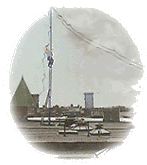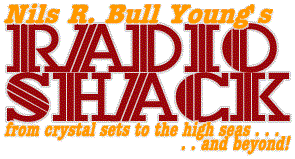
On the bus going to "A" school at NS Norva, back in 1968, I heard sailors
with more time in the suit than I talking about their ships with loving
derogation. I didn't understand that then, and now I have to say that I only understood that feeling the day I left the USS
Saratoga & the USN behind.
I arrived in a cab from
the Jacksonville, Florida airport to the pier where the Sara sat in the
darkness of New Year's Day, 1970. I was sure of my location only because
of the huge number "60" painted on the side of the island. I shuffled aboard and was guided to the communications area by a fellow radioman just coming off liberty. By the time I got to
my bunk, I was 24 years old, my birthday having come in the wee hours of
that distant morning.
The next morning
I was hustled through the formal check in process, met LCDR Aubrey Carson,
the division CO and got to know some of my shipmates. It was a remarkable
time, full of anxiety over what would happen next and desolution over what
I'd left behind . . . in Puerto Rico and back home in Ohio.
Soon enough I was standing watch
with 75 other sailors, training and learning about shipboard radio operations.
And there was plenty to learn.
The difference between
my experiences at the Naval Facility and what I learned aboard the Sara
would fill a small ledger. But the

most
important part of it all was the need for me to learn and stand watch on
any of the positions in my assigned work space. For most of the ensuing year & a half I shuffled messages from other ships in the operations group to the commstas handling the USS Saratoga's monstrous message traffic levels.
The rest of the
time, it was liberty & fun & games. Underway I stood 12-on-and-12-off
watches. Frenetic activity was interspersed with rare and short
intervals of boredom. Then twelve hours off watch, wrapped in my blanket,
asleep on a thin matress on the bottom bunk of the first tier to the right
after entering the berthing spaces port side door. Nearly above my head
was the flight deck. At either end of the work spaces and the berthing
area ran two of the ship's four steam-driven catapults, used to launch
the aircraft. The rumble of the ship, the noisy slam of the "cats"
and nightmares bred of twelve hours at the teletype keyboard filled my
fitful sleep. But ah, the places I saw!
My first and only
"Med" cruise on the Sara started on a chilly June morning in 1971. For
the next four months my 'mates & I in Comm Div pushed and pulled radio
traffic out of the thin air. We loaded and unloaded boxes of teletypewriter
paper and tape and got seriously reasonable liberty in the various ports
that we visited. Not the least of which were Gouroch, Scotland; Genoa,
Italy; Athens, Greece, and Cannes, France. We spent almost

an
entire month at anchor in Athens harbour and got to visit a lot of the
places around there for extended and expensive periods of time.
To this day I can
remember the awe that settled on me as I walked across the smooth stones
of the Acropolis, thinking of all the ancient souls, many of them related to my different family heritages, who had shuffled on the same
stones beneath my feet. The sun would set behind the hills across the wide boulevard that separated the Acropolis from the Dionysis Restaurant. The light turned
the ancient marble pillars of the Atheneaum a soft, regal gold.
Underway or at anchor, in the Med or back at Mayport Naval Station
outside Jacksonville, Florida, my life became consumed with radio. When
I wasn't on watch, I was aft in the Sara's "ham shack," running phone patches
for my shipmates or playinig

CW
on the ship's donated Collins S-Line and one of the "spare" 35 ft whip
antennas. I even set up a small 40m ham station in the apartment that I
rented right on the beach. The owner of the building, John Busch, helped
me set up an antenna on the flat roof and cut me various amounts of slack
on the rent by letting me help him with maintanence & other chores.
I was good at what I did back then. I enjoyed it immensely. And when my final days in the USN set me out

on the street as a civilian, I understood
the deep sense of accomplishment that my father felt for his days in the US Army. Together my father & I were now comrades before the flag, tested and proven by the strange camaradarie of that military experience.
The feeling was
so intense to me that, four years later, I went back into the USN as an
active duty reservist. . .
which leads to the next page.



